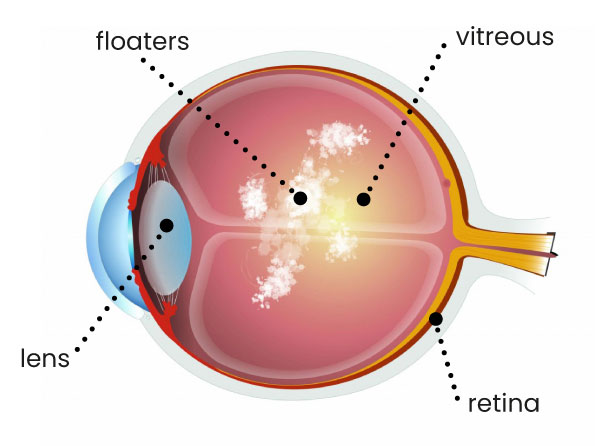Conditions affecting the retina and vitreous humour
Our retina specialist takes charge of treating conditions affecting the retina and vitreous.
- Vitrectomy
Floaters
What are floaters?
If you see black, floating spots, dots or lines in your field of vision, especially against a light background like a computer screen or bright light, that may mean you have ‘floaters’.
These spots move slowly with the movement of your eyes and always look like they are returning to their starting position. They can occur in one eye or both eyes. Floaters are structures that move around in the vitreous, the gel that fills your eyes. Although these are mostly harmless and just a bit annoying, floaters are sometimes a symptom of another condition. Follow-up by your eye doctor is therefore required.

- Black, floating spots, dots or lines in the field of vision.
- Noticeable against light backgrounds, such as a computer screen, white surface or clear sky
- Spots that move with your eyeball in the direction you are looking
- In one eye or both eyes

Welke behandeling bieden we aan?
• Laserbehandeling
Floaters kunnen behandeld worden met een ‘floater laser treatment’ of ‘vitreolysis’. Tijdens deze behandeling zullen laserstralen mini-impulsen uitsturen naar de floaters, waardoor deze tot kleine gasbelletjes verdampen en de glasvochtslierten worden afgebroken. De zwarte vlekjes zullen verdwijnen of verminderen. Deze behandeling wordt enkel aangeraden aan patiënten wanneer kan verwacht worden dat de behandeling een goed effect zal hebben.
Elk oog zal afzonderlijk behandeld worden. Een 30-tal minuten voor de laserbehandeling worden je ogen gedruppeld om de pupil te vergroten. Net voor de behandeling worden er oogdruppels toegediend om de ogen licht te verdoven. Een contactlens wordt dan op het oog aangebracht en laserstralen worden door een speciaal ontworpen microscoop gestuurd.
Deze behandeling is volledig pijnloos. Na de behandeling moet je je laten begeleiden door een chauffeur, maar kan je wel je dagelijkse activiteiten hervatten.
• Operatie - Vitrectomie
In andere gevallen dienen de glasvochttroebelingen verwijderd te worden met een operatie, Vitrectomie genaamd, een operatie waarbij het hele glasachtige lichaam wordt verwijderd.
Age-related macular degeneration (AMD)
What is age-related macular degeneration?
Age-related macular degeneration (AMD) is a condition of the central part of the retina. This part of the retina, the macula, allows us to perceive details. Age-related macular degeneration is often referred to as the ‘wearing’ of the retina or ageing of the retina. AMD affects vision. This can be due to such factors as an hereditary condition, age or environmental factors.

- Less clear or blurred near vision
- Dark spots or dots at the centre of the image
- Distortion of the image, especially of straight lines
- Fading of colours
- Reduced night vision
We start with a detailed examination to determine what form of macular generation you have. This can be either dry or wet age-related macular degeneration. Each form requires a different approach and so a correct diagnosis is crucial.
The principal treatment for wet AMD is anti-VEGF injections, such as ranibizumab, bevacizumab and aflibercept. These stop abnormal blood vessel growth and reduce eye leakage. After a monthly initial injection, the frequency of the follow-up injections will be determined depending on the check-up results – often four to six times a year. Although the injections are effective, they don’t guarantee complete restoration of vision; they mainly stabilise the condition. Regular check-ups by the eye doctor are essential for optimal treatment.
Diabetic retinopathy
What is retinopathy?
If you have diabetes, the blood vessels in the retina may be affected. This is known as diabetic retinopathy. This form of damage to the retina due to leaking or abnormal blood vessels can lead to a deterioration of vision or even blindness. Regular check-ups by your eye doctor are therefore very important.
- Less sharp vision
- Blurred vision
- Spots or floating spots in the field of vision
- Distortion of the image, especially of straight lines
Our eye doctors can close off leaking blood vessels with a laser treatment. The treatment takes half an hour at most. The laser treatment can slow or sometimes stop the deterioration of vision, but it cannot heal retinopathy. Thus the decline in the quality of the retina may continue. It may be necessary for the laser treatment to be repeated several times.
Diabetic patients have greater risk of tears and detachment of the retina. Small tears can be closed up with laser surgery. In the event of retinal detachment, an operation is required.

